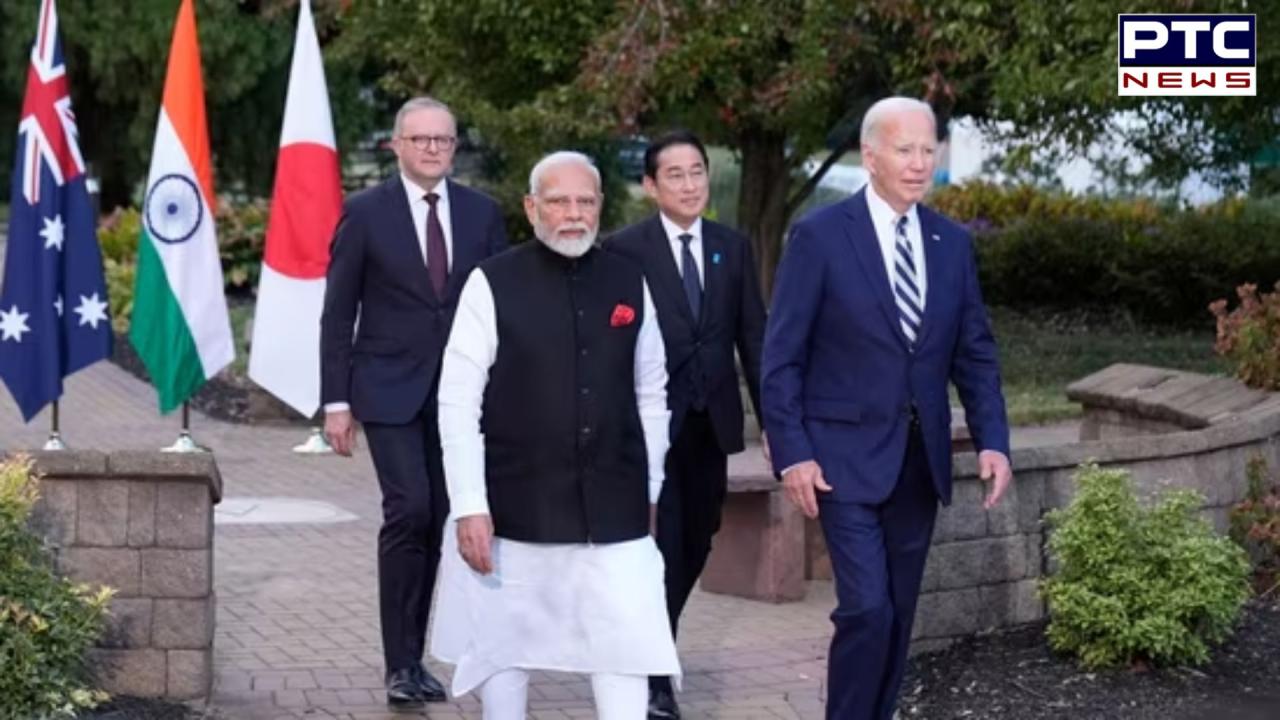

Quad on geopolitics: Unprecedented strong stance on China amid growing concerns over Ukraine conflict
PTC News Desk: In a significant diplomatic move, leaders of the Quad countries—India, the United States, Australia, and Japan—deployed some of the strongest language yet regarding China's actions in the Indo-Pacific region during their recent meeting in Wilmington. While they did not explicitly name China, the leaders expressed serious concerns about the situation in the South and East China Seas, outlining specific actions that have raised alarm and reaffirming their commitment to international legal frameworks that Beijing has repeatedly rejected.
The Wilmington Declaration, issued after the leaders' discussions on Saturday, highlighted issues such as the "militarisation" of disputed territories and "coercive and intimidating maneuvers" in the South China Sea. A comparison with the earlier Hiroshima Declaration from May 2023 indicates that the language surrounding these maritime concerns is now more direct and detailed.
The Quad leaders also addressed the ongoing war in Ukraine, reiterating the importance of peace, respect for sovereignty, and territorial integrity. This meeting marked a notable emphasis on the situation in West Asia, where they called for immediate hostilities to cease and a resolution for the ongoing humanitarian crisis.
Dhruva Jaishankar, executive director of the Observer Research Foundation-America, noted that the Quad's joint statement was detailed and reflected a stronger condemnation of the use of force in the Indo-Pacific. The declaration included broad agreements on various strategic developments in regions such as Gaza, Yemen, Myanmar, and Ukraine.
The Quad condemned China's aggressive actions, particularly its "dangerous use of coast guard and maritime militia vessels," which threaten regional stability. They emphasized that maritime disputes must be resolved peacefully in accordance with international law, specifically the United Nations Convention on the Law of the Sea (UNCLOS), which China has often violated. The leaders reaffirmed the significance of the 2016 Arbitral Award on the South China Sea, which favored the Philippines against China and remains unacknowledged by Beijing.
The Quad's declaration regarding Ukraine marked a commitment to the principles of the UN Charter, emphasising territorial integrity and sovereignty. They expressed deep concern over the ongoing conflict and its humanitarian consequences. Notably, each leader has visited Ukraine since the war's onset, highlighting their commitment to a "comprehensive, just, and lasting peace" consistent with international law.
The declaration underscored the negative impact of the war on global food and energy security and condemned the threat of nuclear weapon use. The Quad urged all states to refrain from using force against the sovereignty of any nation.
A significant change from previous declarations was the Quad's response to the ongoing conflict in West Asia. They condemned the October 7 terror attacks while also expressing concern over the humanitarian crisis in Gaza, emphasising the need for a ceasefire and the release of hostages held by Hamas. They supported a UN resolution advocating for an immediate ceasefire and humanitarian assistance.
The Quad called for increased delivery of humanitarian aid to Gaza and stressed the need for compliance with international law to protect civilian lives. They reiterated their commitment to a viable Palestinian state, taking into account Israel's security concerns as part of a two-state solution.
As tensions rise between Israel and Lebanon, the Quad leaders underscored the necessity of preventing further conflict escalation. They condemned attacks by the Houthis on international vessels in the Red Sea and Gulf of Aden, labeling these actions destabilizing and harmful to maritime safety.
Overall, the Wilmington Declaration reflects the Quad partners' shared concerns about China's actions and their unified stance on addressing pressing geopolitical issues, including those in Ukraine and West Asia. While each country may pursue different pathways based on their unique relationships with key actors, their goals remain aligned in promoting peace and stability in the region.
- With inputs from agencies
